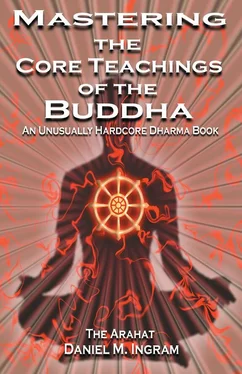Daniel Ingram - Mastering the Core Teachings of Buddha - An Unusually Hardcore Dharma Book
Здесь есть возможность читать онлайн «Daniel Ingram - Mastering the Core Teachings of Buddha - An Unusually Hardcore Dharma Book» весь текст электронной книги совершенно бесплатно (целиком полную версию без сокращений). В некоторых случаях можно слушать аудио, скачать через торрент в формате fb2 и присутствует краткое содержание. Год выпуска: 2009, ISBN: 2009, Издательство: Aeon Books, Жанр: Старинная литература, на русском языке. Описание произведения, (предисловие) а так же отзывы посетителей доступны на портале библиотеки ЛибКат.
- Название:Mastering the Core Teachings of Buddha - An Unusually Hardcore Dharma Book
- Автор:
- Издательство:Aeon Books
- Жанр:
- Год:2009
- ISBN:9781904658405
- Рейтинг книги:5 / 5. Голосов: 1
-
Избранное:Добавить в избранное
- Отзывы:
-
Ваша оценка:
- 100
- 1
- 2
- 3
- 4
- 5
Mastering the Core Teachings of Buddha - An Unusually Hardcore Dharma Book: краткое содержание, описание и аннотация
Предлагаем к чтению аннотацию, описание, краткое содержание или предисловие (зависит от того, что написал сам автор книги «Mastering the Core Teachings of Buddha - An Unusually Hardcore Dharma Book»). Если вы не нашли необходимую информацию о книге — напишите в комментариях, мы постараемся отыскать её.
Mastering the Core Teachings of Buddha - An Unusually Hardcore Dharma Book — читать онлайн бесплатно полную книгу (весь текст) целиком
Ниже представлен текст книги, разбитый по страницам. Система сохранения места последней прочитанной страницы, позволяет с удобством читать онлайн бесплатно книгу «Mastering the Core Teachings of Buddha - An Unusually Hardcore Dharma Book», без необходимости каждый раз заново искать на чём Вы остановились. Поставьте закладку, и сможете в любой момент перейти на страницу, на которой закончили чтение.
Интервал:
Закладка:
This is simultaneously an admission of the limitations of this work, an invitation to adopt a more empowering view of what is possible on the spiritual path, and a warning.
I have had other motivations for writing this book. A number of people have attempted to have me be their meditation teacher. I have done what I can to encourage them to practice well, go on retreats and explore, but as soon as I get the sense that they are not into really doing the work or are trying to idolize me in even small ways, I go out of my way to alienate them completely. I greatly prefer the company of fellow adventurers who wish to explore the mysteries of this life together than any other sort of relationship. Dharma friends may be at different stages in the practice and one friend may teach another something useful, but this has a very different feel from people who are formally teacher and student. Thus, writing this book allows me to hand them the better part of what I know and say, “Here, if you are really into it, there is more than enough here to allow you to plunge as deep as you care to. If not, I have wasted little of my time and can avoid being put on some strange pedestal or pillory, at least to my face.”
That said, I do have the explicit goal of facilitating others to become living masters of this material that they may go forth and help to encourage more people to do so. The more people are able to teach from a place of deeply established personal experience, the more people will be able to learn the dharma well, and the saner and happier the world will be.
This brings me to the question of the issue of what some would call hierarchy. The simple fact is that there are those that have attained to what is called awakening, enlightenment, realization, etc. and those that haven't. There are those with strong concentration abilities and those those without. There are those who have their morality trip together and viii
Foreword and Warning
those that don't. There are those who are masters of some things and those that have more work to do. While there is a strangely pervasive movement in the West to try to imagine everyone is equal in the world of spirituality, it is obviously completely delusional and wrong-headed.
When I went looking for teachers and friends to practice with and help me along, rather than get mad that some people claimed to know more than I did, I was excited by the opportunity, however rare, to study with people who knew what they were doing. This just makes sense. Read this as another warning: if you get good enough at these things, people will often have bad reactions to you if you go around talking about it, and the number who will instead find your achievements a source of inspiration and empowerment, as they rightly should, will likely be few.
On that same front, it is a very strange thing to have such a completely different language, set of experiences and perspectives from most of the people around me. I can often feel like an alien wearing a trench coat of normalcy, and I dream of a world where conversations about the sorts of events and insights that have come to dominate my everyday experience are much more common and normal. Reading between the lines, you should take this admission as yet another warning. If you get way into this stuff, you will discover this same loneliness.
I should also mention that I consider myself and many of those who hail from the lineages from which I primarily draw to be dharma cowboys, mavericks, rogues, and outsiders. Really wanting to get somewhere is a sure ticket to feeling this way in most Western Buddhist circles. What is ironic is that I also see myself as an extreme traditionalist. The strange thing is that these days to be a Buddhist traditionalist, one who really tries to plunge the depths of the heart, mind and body as the Buddha so clearly admonished his followers to do, is to fly in the face of much of mainstream meditation culture.
In that same vein, I should further mention that the path I have followed has been dangerous, destabilizing more often than calm, excruciating more often than pleasant, harder to integrate than most other dharma paths I have heard of, and in general quite a rough ride. It has also been profound, amazing, and more glorious than most other paths I have heard tell of. Surfing the ragged edges of reality has been ix
Foreword and Warning
easier for me than slowing the thing down. In my explorations, accidents and adventures, I have learned a lot about not only how to make very fast progress in meditation but also a lot about how to do so without completely wiping out. I hope that I can pass on some of the knowledge of both in this book. This should be seen as another warning. This book and the path presented in it are not for the damaged and unstable spiritual seeker. You have to have your psychological trip fairly together to be able to handle the intense techniques, side effects and results I am about to discuss.
I would like to thank the very many people whose influence,
friendship, support and kindness went into making this work what it is, though they are way too numerous to list here. This is an
interdependent universe, and so to write that this work is simply by me is not in accord with reality. It would be absurd not to acknowledge the extensive support of Carol Ingram, Sonja Boorman, David Ingram, Christina Jones, Christopher Titmuss, Sharda Rogell, Bill Hamilton, Kenneth Folk and Robert Burns, all of who were very instrumental in making what is good in this book and my own practice possible. I would also like to thank John Hawley, Roger Windsor, Daniel Rizzuto and Michael Wade for all their help with editing. However, the
responsibility for any flaws this work may contain must fall squarely on me. I can’t be sure that all of these fine people would even want their names associated with this work, but I reserve the right to express my deep gratitude nonetheless.
A brief note on style… The English language has no great way to use pronouns that refer to a single person without getting gender-specific.
Various solutions exist, such as constantly using “he/she” (which can be very distracting), alternating between “he” and “she”, and recasting sentences in the plural, where the pronoun “they” may be used. For better or for worse, I am going to use the pronoun “they” to mean
“he/she,” thus using what is ordinarily a plural pronoun with verbs in the singular. I am not particularly thrilled with this solution, but I don’t think it is much worse than the others. Should a reader disagree, I hope that he/she will find a way to forgive me, or at least that she will understand the problem, making room in his heart for one more author struggling with this linguistic limitation. I must also admit that I am x
Foreword and Warning
somewhat erratic in my use of capital letters, and you may just have to Live With It.
May this work be for the benefit of all beings. May you realize what you are truly looking for, pursue it relentlessly despite all obstacles, and find it.
xi
PART I: THE FUNDAMENTALS
1
1.INTRODUCTION TO PART I
If you didn’t read the Foreword and Warning, do so now.
The Buddhist path has often been called a “spiritual path,” and this use of religious language can be very inspiring for some people. The Buddhist path could also be thought in terms of a scientific experiment, a set of exercises that the Buddha and those who have followed him have claimed lead to very specific effects, effects that they deemed worthwhile. Using this sort of practical language can also be very inspiring for some people. In an attempt to inspire a wide audience, I will use both spiritual and practical or technical language when discussing these issues. However, my preference is generally for the practical language. You could throw out all of the spiritual trappings on the Buddhist path and still have a set of basic practices that lead to the effects promised. You could also keep all of the spiritual trappings, do the basic practices, and produce the same results, assuming of course that you had the extra time and resources necessary to do both.
Читать дальшеИнтервал:
Закладка:
Похожие книги на «Mastering the Core Teachings of Buddha - An Unusually Hardcore Dharma Book»
Представляем Вашему вниманию похожие книги на «Mastering the Core Teachings of Buddha - An Unusually Hardcore Dharma Book» списком для выбора. Мы отобрали схожую по названию и смыслу литературу в надежде предоставить читателям больше вариантов отыскать новые, интересные, ещё непрочитанные произведения.
Обсуждение, отзывы о книге «Mastering the Core Teachings of Buddha - An Unusually Hardcore Dharma Book» и просто собственные мнения читателей. Оставьте ваши комментарии, напишите, что Вы думаете о произведении, его смысле или главных героях. Укажите что конкретно понравилось, а что нет, и почему Вы так считаете.












